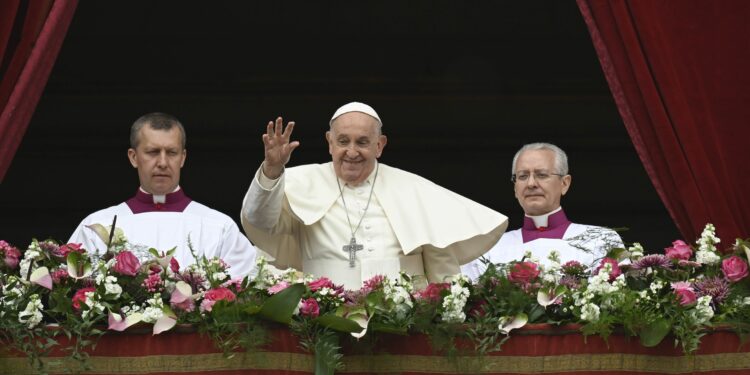The pope asked the Lord to open paths of peace on the African continent, praying especially for “the suffering peoples in Sudan and in the entire region of the Sahel, in the Horn of Africa, in the region of Kivu in the Democratic Republic of the Congo, and in the province of Capo Delgado in Mozambique.”
He also prayed for the risen Lord to assist the people of Haiti, calling for “an end to the acts of violence, devastation, and bloodshed in that country, and that it can advance on the path to democracy and fraternity.”
Pope Francis encouraged the discussions taking place between Armenia and Azerbaijan, urging that with the support of the international community, they can “pursue dialogue, assist the displaced, respect the places of worship of the various religious confessions, and arrive as soon as possible at a definitive peace agreement.”
He prayed for reconciliation in Myanmar and for Christ to grant consolation and strength to the Rohingya people as they face “a grave humanitarian crisis.”
“On this day when we celebrate the life given us in the resurrection of the Son, let us remember the infinite love of God for each of us: a love that overcomes every limit and every weakness,” Pope Francis said.

“And yet how much the precious gift of life is despised! How many children cannot even be born? How many die of hunger and are deprived of essential care or are victims of abuse and violence? How many lives are made objects of trafficking for the increasing commerce in human beings?”
“May the light of the Resurrection illuminate our minds and convert our hearts, and make us aware of the value of every human life, which must be welcomed, protected, and loved. A happy Easter to all!” he said.
A plenary indulgence, or the remittance of temporal punishment due to sins that have already been forgiven, is granted to those who participate in the urbi et orbi blessing in person or through radio, television, or the internet.
The usual conditions for a plenary indulgence must be met: The individual must be in a state of grace and have complete detachment from sin. The person must also pray for the pope’s intentions and sacramentally confess their sins and receive Communion up to about 20 days before or after the indulgenced act.
(Story continues below)
Subscribe to our daily newsletter
Credit: Source link





